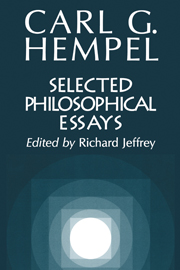Book contents
- Frontmatter
- Contents
- Preface
- Dates
- Introduction
- TRUTH
- Chapter 1 On the Logical Positivists' Theory of Truth
- Chapter 2 Some Remarks on “Facts” and Propositions
- Chapter 3 Some Remarks on Empiricism
- Chapter 4 The Problem of Truth
- Chapter 5 The Irrelevance of the Concept of Truth for the Critical Appraisal of Scientific Theories
- PROBABILITY
- METHODOLOGY
- MEMOIRS
- C. G. HEMPEL'S PUBLICATIONS
- Index
Chapter 2 - Some Remarks on “Facts” and Propositions
Published online by Cambridge University Press: 05 June 2012
- Frontmatter
- Contents
- Preface
- Dates
- Introduction
- TRUTH
- Chapter 1 On the Logical Positivists' Theory of Truth
- Chapter 2 Some Remarks on “Facts” and Propositions
- Chapter 3 Some Remarks on Empiricism
- Chapter 4 The Problem of Truth
- Chapter 5 The Irrelevance of the Concept of Truth for the Critical Appraisal of Scientific Theories
- PROBABILITY
- METHODOLOGY
- MEMOIRS
- C. G. HEMPEL'S PUBLICATIONS
- Index
Summary
1. In a recent article in Analysis (vol. 2, no. 5), Prof. Schlick traces the outlines of his view concerning the relationship of propositions to “facts.” In this account, Prof. Schlick makes a contribution for which we must be grateful by elucidating some essential points of his article “Das Fundament der Erkenntnis” (Erkenntnis 4 [1933], 79), which occasioned a logical controversy, the fundamental ideas of which I tried to characterize in my note “On the Logical Positivists' Theory of Truth” (Analysis, vol. 2, no. 4).
In his paper, Prof. Schlick raises certain objections to some of the considerations which I sketched in my article and which correspond to Dr. Neurath and Prof. Carnap's view; he gives his objections the form of questions, which may be summed up by asking: What harm is there in saying that propositions are compared with “facts” and that true propositions express “facts”? To this question I shall try to reply.
2. Prof. Schlick illustrates the character of the comparison between a proposition and “facts” by means of a very instructive example. But I think that in an essential respect his account is not quite adequate.
For on the one hand Prof. Schlick expressly describes propositions as empirical objects (of a special kind) which may be compared with any other empirical object. So far I fully agree with him.
- Type
- Chapter
- Information
- Selected Philosophical Essays , pp. 21 - 25Publisher: Cambridge University PressPrint publication year: 2000



